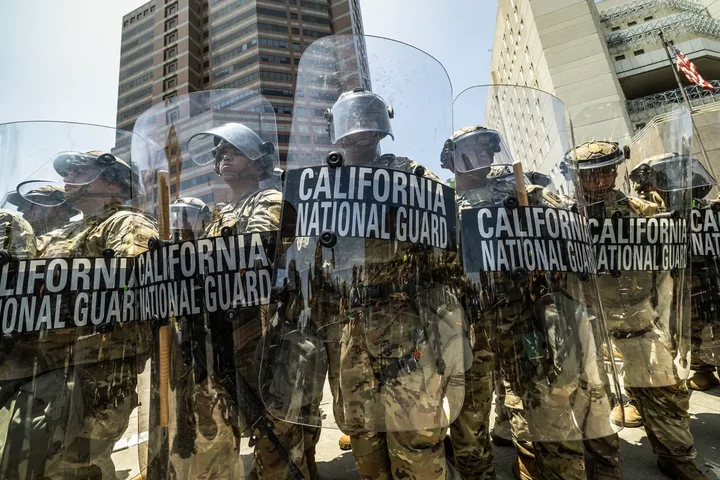California National Guard soldiers stand with shields outside the Federal Detention Center in downtown Los Angeles, on June 8, 2025. Photo by Ted Soqui for CalMatters
###
This story was originally published by CalMatters. Sign up for their newsletters.
###
Does President Donald Trump or Gov. Gavin Newsom have final say on deploying the California National Guard to Los Angeles? And when can a sitting president send the Marines to a U.S. city, as Trump did in L.A.?
Those are the questions at the heart of a rapidly moving legal challenge Newsom and California Attorney General Rob Bonta filed against Trump that is scheduled to get its first hearing starting at 1.30 p.m. today at a federal court in San Francisco.
What the judge rules, and the likely appeals that follow, may alter decades of understanding about the roles of governors and the White House in quelling domestic unrest.
Some legal experts called Trump’s moves to bring in troops unnecessary and an abuse of power. Newsom has argued that and more. He delivered a fiery speech Tuesday that likened Trump to other “failed dictators.”
“Authoritarian regimes begin by targeting people who are least able to defend themselves, but they do not stop there,” Newsom said. “Trump and his loyalists, they thrive on division because it allows them to take more power.”
But Jessica A. Levinson, a constitutional law scholar at Loyola Marymount University in Los Angeles, said that blocking the president’s authority is “going to be a hard argument for the governor to make” during an appearance on the Dan Abrams Show on Wednesday.
The administration argues that the armed troops will do what local law enforcement has so far been unable to do: Bring order to the streets of L.A. Critics, including Newsom, counter that sending soldiers — especially Marines trained for the battlefield — to quell a civil disturbance is just as likely to inflame the situation and ratchet up the risk of violence.
Trump called up the National Guard to Los Angeles on Saturday after protests broke out in response to federal immigration officers raiding work sites and arresting individuals they say are in the country without authorization. Trump’s order cited “incidents of violence and disorder” in his message. The soldiers will “temporarily protect” the immigration enforcement officers, the memo said.
The president has so far ordered 4,000 National Guard and 700 U.S. Marine troops to L.A. The judge on the case is Charles Breyer, who was appointed by President Bill Clinton, a Democrat.
Trump has not yet invoked the Insurrection Act, a law that would give him more authority to deploy troops domestically and use them for law enforcement. As is, the National Guard soldiers are charged with protecting federal agents and building.
Core to Trump’s justification was a federal statute that only one president had previously used, Bonta’s legal team wrote. President Richard Nixon employed it so that the National Guard could deliver the mail during the U.S. Postal Service strike of 1970. It’s also the first time since 1965 that a president federalized a state National Guard without the request of a governor.
Newsom and Bonta sued Monday after the governor formally asked Trump to rescind his activation of the Guard. They filed the suit just as news outlets began reporting that Defense Secretary Pete Hegseth would deploy the U.S. Marines to Los Angeles, as well. On Tuesday Newsom and Bonta sought a temporary restraining order to halt both orders.
The California challenges argue that involving the Marines and National Guard harms state sovereignty, drains California’s resources and “escalates tensions and promotes (rather than quells) civil unrest.”
Newsom’s suit says the city does not need the military to keep the peace. “To put it bluntly, there is no invasion or rebellion in Los Angeles; there is civil unrest that is no different from episodes that regularly occur in communities throughout the country, and that is capable of being contained by state and local authorities working together,” the suit said.
He also maintains that a president cannot deploy the National Guard without approval from the state governor. Newsom and Bonta cite the government code that permits Trump to deploy the National Guard, which says federalizing the troops is “issued through” the governor.
The Trump legal team offers the opposite interpretation of the government code: “The statute is thus clear that the orders are issued by the President, and they are conveyed through State officials. Nothing in the statute entitles a Governor to veto or impede a valid presidential order,” the team wrote in their filing on Wednesday.
The filing excoriated Newsom’s pitch for a restraining order as a “crass political stunt endangering American lives.” It also said local and state law enforcement were “unable to bring order to the city”
Levinson underscored the stakes of the case: “Saying that you need the governor’s consent would mean that any single governor would have the ability to essentially veto the president using power under this statute.”
Chris Mirasola, a law professor at the University of Houston, wrote that the issue has seen “no meaningful challenges” but that this is an area in which the “courts have traditionally been exceedingly deferential to the executive branch.”
Bonta told reporters on Monday that challenging Trump on his powers has few precedents, since deploying troops without a governor’s support is rare. “This is not a section of the law that’s been subject to multiple opinions and has a lot of case law on it,” he said.
Eighteen state attorneys general who are Democrats backed Bonta. “The president’s decision to federalize and deploy California’s National Guard without the consent of California state leaders is unlawful, unconstitutional, and undemocratic,” they issued in a joint statement.
###
Ben Christopher contributed to this story.

CLICK TO MANAGE